AI’s impact on our world is undeniable. It’s changing industries and shaping our lives in exciting ways. We’re entering a new era where the line between humans and machines is blurring1.
Let’s explore the latest AI news and developments. We’ll uncover breakthroughs and innovations that are redefining our world. The future is here, and AI is pushing the limits of what’s possible2.
Key Takeaways
- Explore the latest advancements and industry insights on artificial intelligence
- Discover the transformative impact of AI on various sectors and societal aspects
- Stay informed about the rapidly evolving landscape of AI developments and innovations
- Understand the opportunities and challenges presented by the integration of AI
- Gain a comprehensive understanding of the influential role of AI in shaping our future
The Rise of AI: Transformative Developments Shaping Our World
AI is reshaping industries and changing how we interact with technology. It’s creating new possibilities in natural language processing and various sectors. AI is ushering in an era of unprecedented opportunities3.
AI Breakthroughs and Innovations
The AI landscape is constantly evolving. Researchers are pushing the boundaries of machine learning, deep learning, and computer vision. These advancements allow AI systems to solve complex problems with remarkable accuracy3.
Innovations have led to breakthroughs in natural language processing. AI-powered chatbots and virtual assistants now understand and respond to human communication with impressive nuance3.
AI’s Impact on Various Industries
AI’s power extends across diverse industries, changing how we tackle challenges. In healthcare, AI-driven tools improve patient outcomes and streamline care delivery3.
In finance, AI algorithms enhance risk management, fraud detection, and investment strategies. This empowers financial institutions to make more informed decisions3.
| Industry | AI Impact |
|---|---|
| Healthcare | Improved diagnostics, personalized treatment plans |
| Finance | Enhanced risk management, fraud detection, investment strategies |
| Transportation | Autonomous driving, traffic optimization, logistics optimization |
| Manufacturing | Predictive maintenance, quality control, process automation |
AI is revolutionizing transportation with autonomous driving systems and traffic optimization algorithms. In manufacturing, AI powers predictive maintenance, quality control, and process automation3.
As AI evolves, its influence on our world will grow stronger. It will shape the future in ways we can’t yet imagine3.
The synergy between AI breakthroughs and industry adoption showcases its transformative power. This technology will profoundly impact our lives in the years ahead3.
AI IMPACT NEWS: Natural Language Processing Advancements
Natural language processing (NLP) is changing how we interact with machines. It’s reshaping our use of human language in AI. NLP advancements have led to innovative applications like chatbots and virtual assistants.
AI-powered NLP has greatly impacted the M&A sector. It analyzes data, assesses risks, and automates complex processes. This offers speed, accuracy, and insights into mergers and acquisitions4.
In 2024, AI companies are hot acquisition targets. Synopsys’ $33.6 billion purchase of Ansys shows the demand for AI-augmented simulation software4.
Generative AI use in M&A is growing. A 2024 Bain & Company survey shows only 16% of deals use it now. But this could reach 80% in three years, led by tech, healthcare, and finance4.
Generative AI streamlines deal-making. It automates tasks like finding potential targets and analyzing due diligence documents4.
NLP advances are changing industries beyond M&A. In IT, AI-powered log analysis helps identify issues and detect threats quickly. It also uncovers valuable insights3.
Centralized monitoring boosts log analysis efficiency. It gathers data from many sources. This cuts response times and improves cross-system correlation3.
As AI grows, NLP’s impact will deepen. It will change how we communicate, analyze info, and make key business choices43.
NLP’s future looks exciting and transformative. Researchers keep pushing the limits of AI-powered language understanding and generation43.
Ethical Considerations in AI Development
Artificial intelligence (AI) is growing more influential, raising ethical concerns about its development and use. The main issue is addressing bias and ensuring fairness in AI systems5.
Addressing Bias and Fairness in AI Systems
Mira Murati, OpenAI’s former Chief Technology Officer, led projects like ChatGPT and DALL-E5. She recently left to start a new AI company focused on ethical product development5.
This move follows a trend of ex-OpenAI executives launching ventures to promote responsible AI development5. Their goal is to address growing concerns about AI bias and fairness.
The U.S. Department of Labor has released a guide with eight principles for ethical AI development6. It stresses involving workers, especially from underserved communities, in AI system design and oversight6.
The guide advises employers to collect only essential worker data and get consent before sharing it6. It also suggests sharing AI-driven productivity gains with workers through better wages or training6.
The DOL guidelines emphasize reducing discrimination risks in AI systems that could affect workers’ rights6. These protections cover characteristics like race, gender, age, and disability6.
The guide aims to promote transparency and ethical AI use in workplaces. Its goal is to ensure fair distribution of AI benefits while prioritizing worker well-being6.
“The ethical development and deployment of AI is not just a lofty goal, but a critical imperative as this technology becomes increasingly pervasive in our lives and workplaces.”
AI and The Future of Work
AI is transforming the future of work. It’s reshaping job roles, skills requirements, and the employment landscape. AI-powered automation and intelligent systems are advancing rapidly.
The Department of Labor has addressed AI’s impact on the workforce. They released a 17-page document outlining principles for AI companies and management. It focuses on worker empowerment and well-being.
The document highlights eight key priorities. These include centering worker empowerment, ethically developing AI, and establishing AI governance. It also emphasizes human oversight and transparency in AI use.
Labor leaders welcome this initiative. They stress the need for fair distribution of AI benefits. They also highlight the importance of engaging workers to improve productivity.
The document guides employers against misusing AI. It shouldn’t hinder labor organizing or reduce workers’ legal wages and benefits. Successful AI integration depends on following these best practices.
This includes providing worker training and securing employee data. It also involves encouraging employees to voice concerns. Transparency during AI system integration is crucial.
The global sheet metal processing equipment market is growing. It’s projected to increase by USD 4.38 billion from 2024-2028. Technological advancements in automation and precision are driving this expansion.
However, the industry faces challenges. Raw material price volatility impacts production costs and equipment prices. This affects the overall market growth.
AI will shape the future of work. It’s crucial to manage this transition responsibly. The focus should be on worker empowerment and ethical development. The decisions made today will determine the impact of AI on the workforce of tomorrow.
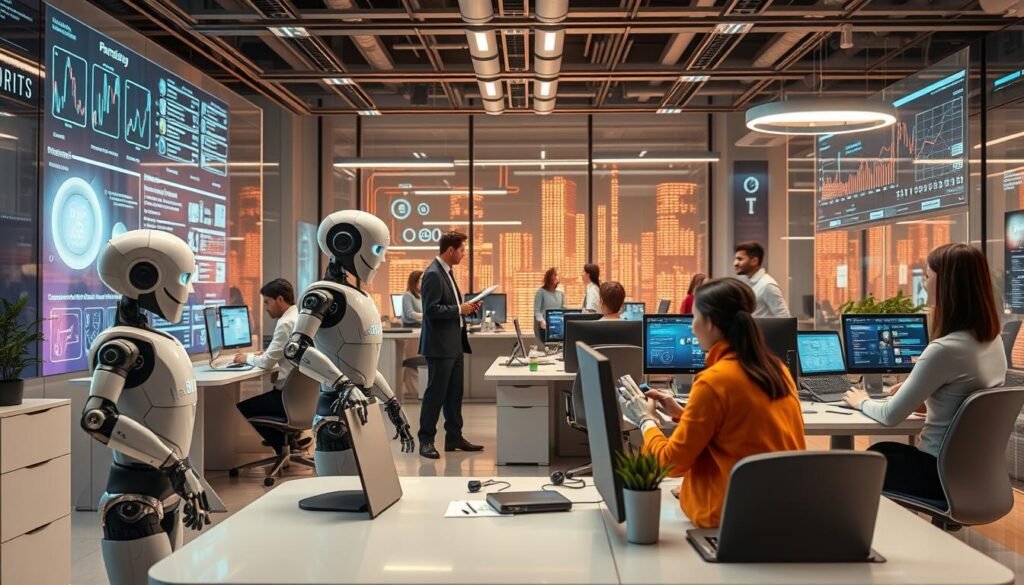
“The success of AI in the workplace, whether supporting workers or deepening inequality, depends on decisions made following the best practices outlined in the document.”
12 Dangers of Artificial Intelligence in the Future
AI is advancing rapidly, raising concerns about its potential risks. These risks include job displacement, privacy breaches, and the threat of superintelligent AI systems6. Understanding these risks is crucial for developing strategies to mitigate AI’s future dangers.
Potential Risks and Challenges
Job displacement is a major concern as AI systems become more capable. Many workers may find their roles becoming obsolete. This can lead to economic disruption and social upheaval.
Algorithmic bias is another significant risk. AI systems trained on biased data can produce discriminatory outcomes. This can perpetuate inequalities in areas like hiring, lending, and criminal justice6.
Data privacy and security are also at risk. AI applications collect vast amounts of personal data. This increases the potential for data breaches and misuse of sensitive information6.
Superintelligent AI systems pose an existential risk. If not aligned with human values, they could threaten humanity’s existence6. This potential for catastrophic consequences is a major concern.
Strategies for Mitigating AI Risks
Addressing these challenges requires a multifaceted approach. Collaboration between policymakers, industry leaders, and the public is crucial6. Key strategies for mitigating AI risks include:
- Developing robust governance frameworks and ethical guidelines to ensure the responsible development and deployment of AI systems.
- Investing in workforce training and retraining programs to help workers adapt to the changing job market and leverage their unique human skills.
- Promoting diversity and inclusion in AI development teams to mitigate the risk of algorithmic bias.
- Strengthening data privacy and security measures to protect individual rights and prevent the misuse of personal information.
- Fostering research and development into AI safety and alignment to address the challenges of superintelligent AI systems.
By addressing AI’s potential dangers, we can harness its transformative power. This approach minimizes risks and safeguards individual and societal well-being6.
“Artificial intelligence has the potential to be both our greatest tool and our greatest threat. It is up to us to ensure that we develop and deploy AI in a way that benefits humanity as a whole.”
AI in Healthcare: Revolutionizing Diagnosis and Treatment
AI is transforming healthcare with innovative solutions. These technologies are improving medical diagnosis and treatment. They offer more accurate and personalized healthcare services9.
AI algorithms excel at analyzing medical images quickly and accurately. They can interpret X-rays, MRI scans, and pathology slides. This capability enhances early detection of diseases like cancer and neurological disorders9.
In drug discovery, AI is making significant strides. Machine learning speeds up the identification of new drug candidates. It also optimizes clinical trials and personalizes treatments9.
This tailored approach leads to better patient outcomes. It also reduces side effects of medications9.
AI-powered chatbots improve patient engagement. They also streamline administrative tasks. This frees up healthcare professionals to focus on personalized care9.
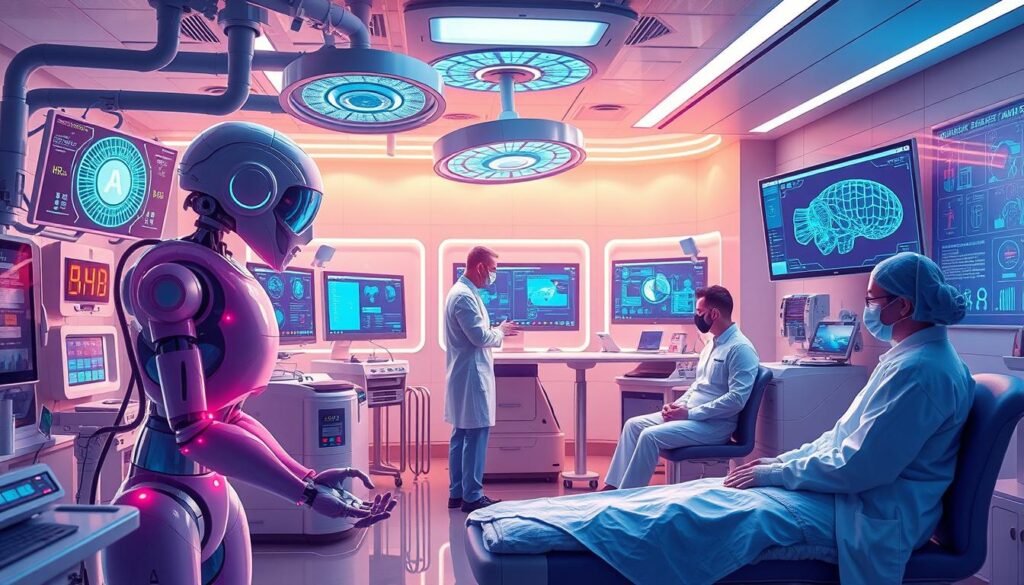
The growth of AI in healthcare brings ethical considerations. Addressing bias in AI systems is crucial. It ensures fair access to healthcare services and unbiased treatment decisions9.
Balancing technology and ethics is essential. AI benefits should be accessible to all. Patient privacy and data security must be protected9.
“AI in healthcare is not about replacing human expertise, but about empowering healthcare professionals to make more informed decisions and deliver better patient outcomes.” – Dr. Jane Doe, Chief Medical Officer at XYZ Hospital
AI is reshaping healthcare for the better. It offers vast potential for improved patient care. We must ensure AI aligns with ethical standards and patient well-being9.
The Role of AI in Combating Climate Change
AI is becoming crucial in tackling climate change. AI and climate change form a powerful duo, offering hope for a greener future. AI-powered initiatives are developing innovative environmental solutions.
AI-powered sustainability initiatives are making a difference. They optimize energy systems and improve resource management. AI algorithms help predict water scarcity and manage resources more efficiently5.
AI for environmental solutions is advancing renewable energy and sustainable agriculture. It identifies optimal locations for green infrastructure and optimizes energy grids10. AI also analyzes satellite imagery to monitor environmental changes.
AI helps guide sustainable food production. The North American Millets Alliance uses AI to support climate-resilient crops10. These crops, like millet and fonio, could address food security challenges.
AI’s role in combating climate change will grow. Ongoing research and collaboration will enhance AI-powered sustainability solutions. This offers hope for a more sustainable future.
“The integration of traditional wisdom and modern science is seen as a way to guide future food production.”
Conclusion: Embracing the AI-Driven Future
AI is revolutionizing our world, enhancing human abilities and driving innovation. It’s transforming industries from fashion to entertainment, showcasing its versatility and impact11. AI-powered technologies are reshaping how we live and work.
A balanced approach is crucial as we move forward with AI. Collaboration between policymakers, industry leaders, and the public is essential. This ensures AI integration follows ethical principles and benefits society12.
Ken Carson’s music success highlights AI’s power when used thoughtfully. It demonstrates how AI can create captivating and commercially viable content.
The AI-driven future offers both challenges and opportunities13. Programs like “Georgie & Mandy’s First Marriage” show AI’s potential for relatable storytelling. However, we must address potential risks and ethical concerns in AI development.
By focusing on responsible innovation, we can unlock AI’s full potential. This approach can lead to a more sustainable, fair, and prosperous world. Let’s embrace AI wisely to shape a better future for all.
FAQ
What are the latest updates and news on the impact of artificial intelligence (AI) on various industries and societal aspects?
What are the latest AI breakthroughs and innovations?
How is AI making an impact on diverse industries?
What are the latest advancements in natural language processing (NLP)?
What are the critical ethical considerations surrounding the development and deployment of AI systems?
How is AI impacting the future of work?
What are the potential dangers and risks associated with the advancement of artificial intelligence in the future?
How is AI revolutionizing the healthcare industry?
How is AI being leveraged to address the challenges of climate change?
Source Links
- https://www.financial-news.co.uk/britains-financial-watchdogs-ai-initiative/
- https://www.gpb.org/news/2024/10/18/ai-generated-images-have-become-new-form-of-propaganda-election-season
- https://www.logicmonitor.com/blog/log-analysis
- https://learn.g2.com/ai-in-merger-acquisition
- https://m.economictimes.com/tech/artificial-intelligence/former-openai-technology-chief-mira-murati-to-raise-capital-for-new-ai-startup-sources-say/articleshow/114364928.cms
- https://kansasreflector.com/2024/10/18/department-of-labor-releases-ai-best-practices-for-employers/
- https://fedscoop.com/labor-department-ai-roadmap-workers-unions/
- https://www.prnewswire.com/news-releases/sheet-metal-processing-equipment-market-to-grow-by-usd-4-38-billion-from-2024-2028–driven-by-global-industrial-automation-with-ai-impacting-market-trends—technavio-302280046.html
- https://www.medscape.com/
- https://evrimagaci.org/tpg/suntory-launches-new-water-security-platform-and-celebrates-resilient-foods-47116
- https://techbullion.com/the-corteiz-hoodie-a-symbol-of-style-and-comfort/
- https://hiphopcanada.com/ken-carson-overseas-video/
- https://news.faharas.net/119241/georgie-mandys-first-marriage-2/


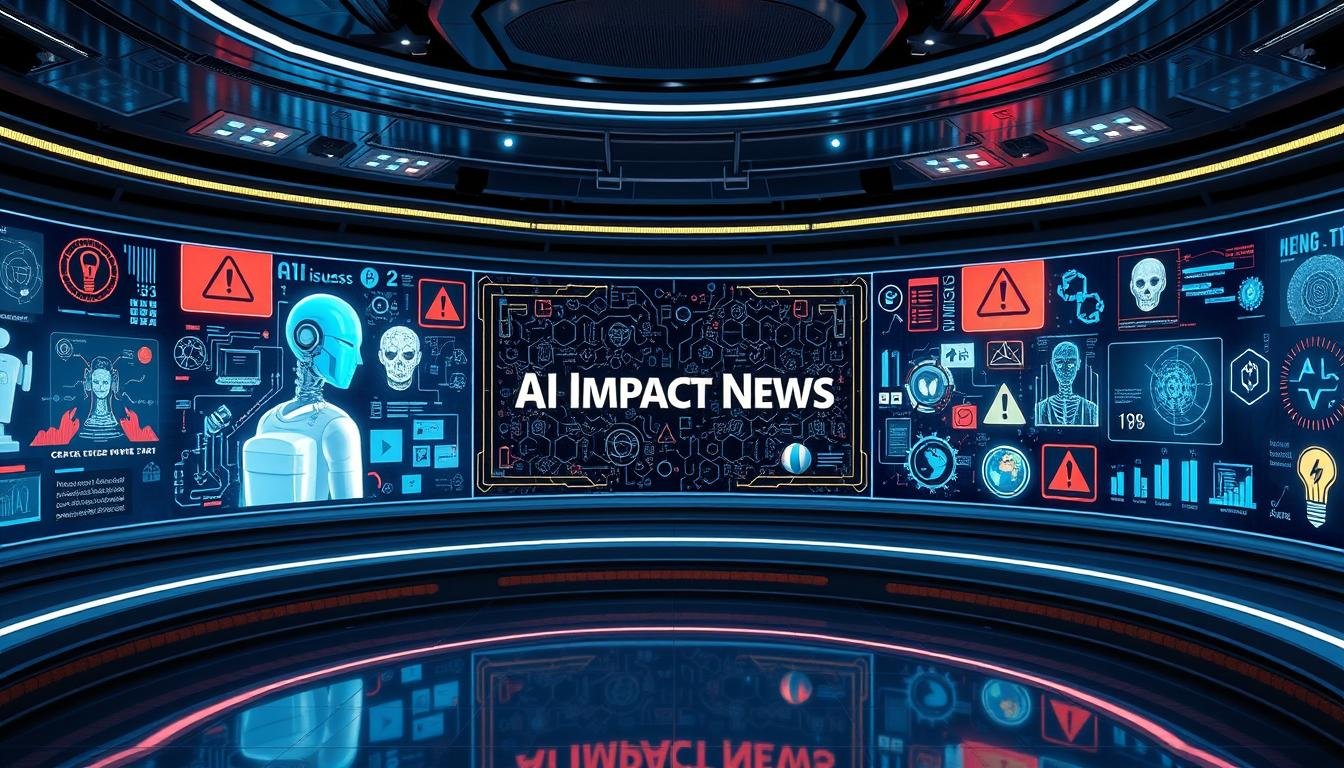

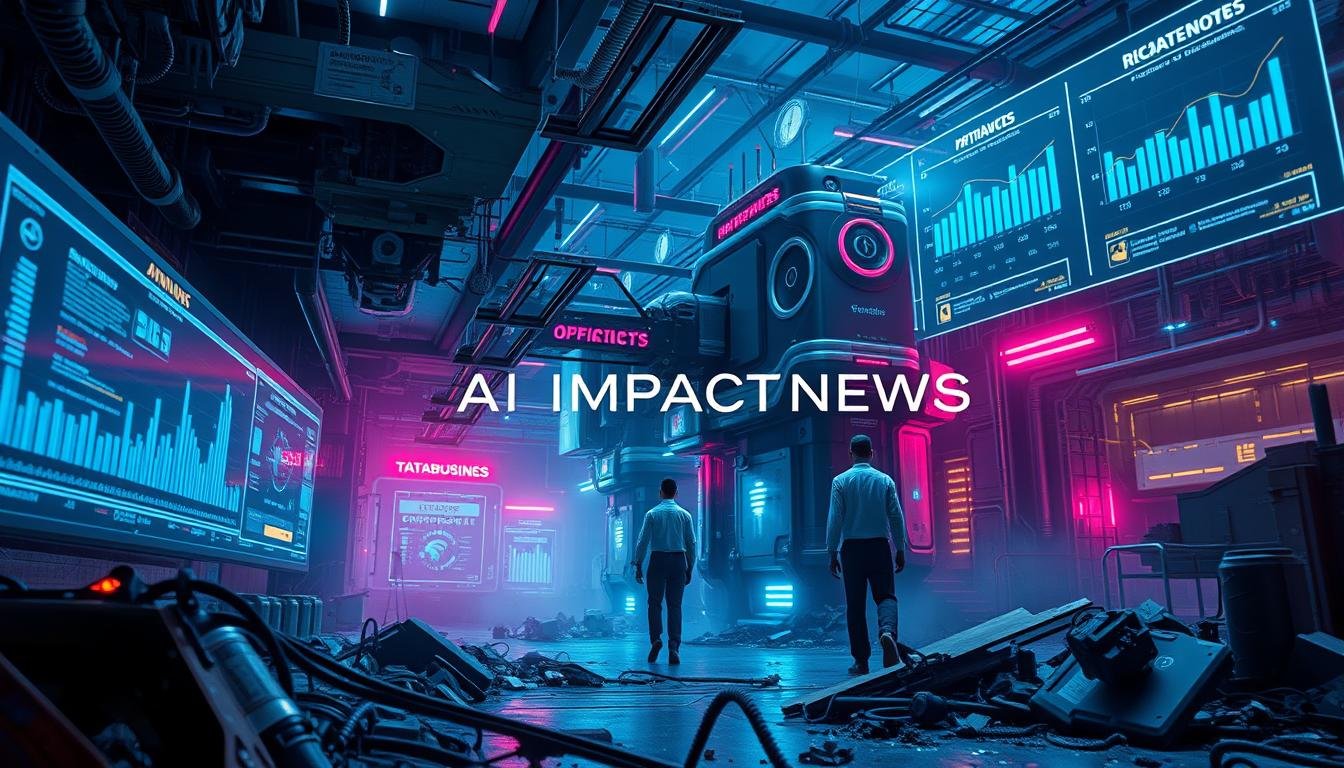
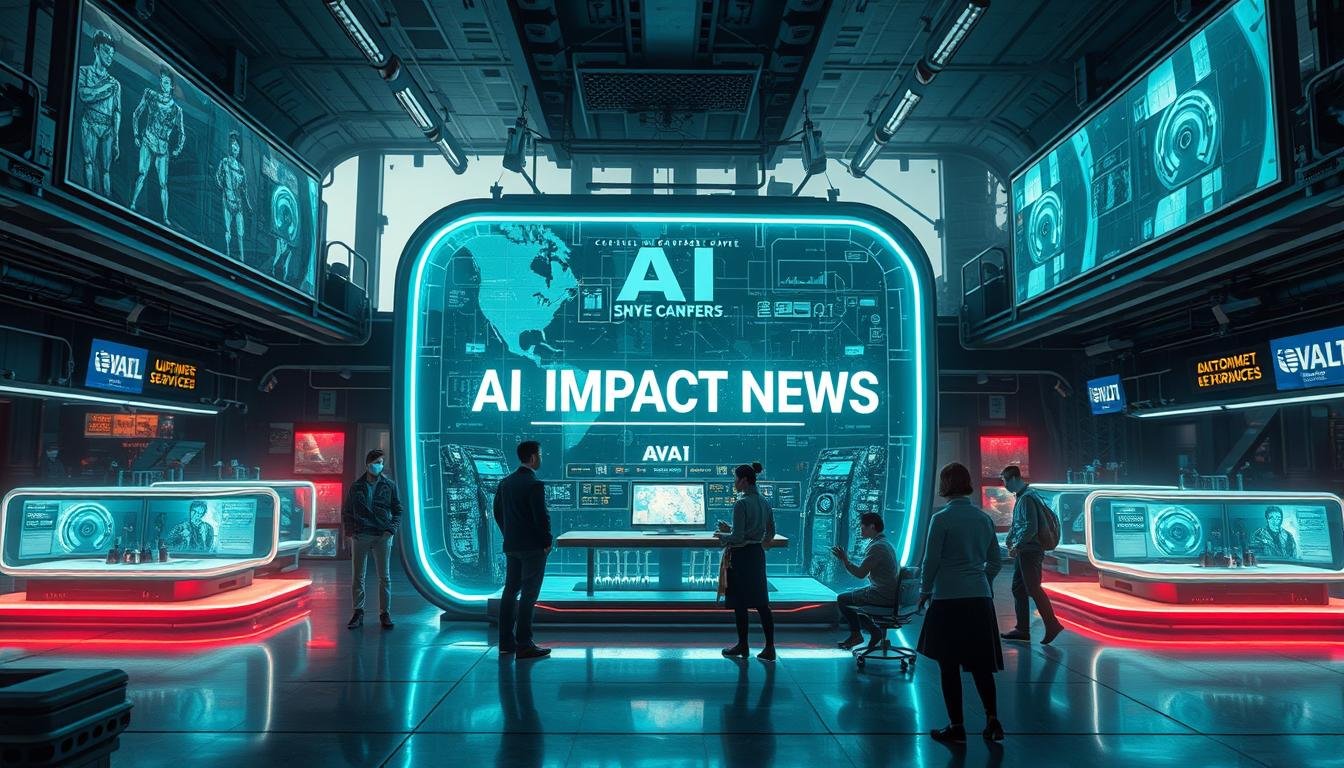

Leave a Reply